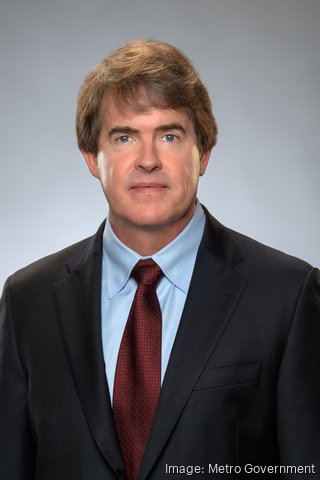Nashville's finance chief says the city can afford to be aggressive when recruiting companies and attracting other business activity, because now it's on better fiscal footing.
"Being in the 'back seat,' that happens," Kevin Crumbo, who is Metro's director of finance, said in an interview. "But that’s not forever."
He added: "I don’t want you to take that as a cue that we need to do incentives the way we did in the past, but rather, we need be open to incentives and be competitive where that’s to our advantage. We need to be open to incentivizing the business we want, whether that's corporate relocations or trade shows. … Let's look at the type of business we want to attract — and then let’s be very aggressive about going to get it."
Crumbo was referring to a comment he made at a Metro Council meeting 13 months ago, a remark as memorable for its visual imagery as its impact. It marked a clear break from how the city had viewed economic development over the past dozen years, and many in the business community worried that publicly pausing incentives would hurt the city's business-friendly reputation.
At the time, Crumbo was erasing a $41.5 million budget gap while facing the threat of "dramatic action" from the state comptroller to fix those financial woes. The day before, executives from Microsoft Corp. left Nashville without going on scheduled office building tours, after a meeting in which aides to Mayor John Cooper explained no city incentives would be offered for an office of between 500 to as many as 1,500 jobs (which the company later announced in Atlanta).
"I know that my friends in the business community won’t be happy about some of the choices that are embedded in here, or some of those I think we’ll make just to improve our position a little bit," Crumbo said in December 2019. "But economic development right now, between now and the end of the [fiscal] year, I think is going to continue with or without a big bolster from the Metro government. That’s not sustainable, and we’ll certainly need to bolster it in the future, but between now and the end of June, it’s going to have to be in the back seat."
The Covid-19 pandemic wreaked new havoc, with Crumbo's office forecasting as much as $472 million of revenue losses over a 16-month span. Cooper proposed a record-setting 32% property tax hike in a self-labeled "crisis budget" for the current fiscal year. Metro Council wound up approving a 34% increase, lifting the rate from its then-record-low level.
Metro's cash flow has rebounded, its rainy-day fund is much healthier, and the city's bond ratings are improving, Crumbo said.
"I really sincerely believe that now that we’ve reached a sustainable point when it comes to attracting business of all kinds to Nashville. Whether it’s how we try attract companies as a government, or how we attract organizations to do conventions, Nashville needs to understand that it will have to go compete for that," Crumbo said. "Other localities will compete for that. It's time to be predatory and go get business that supports our local economy."
Crumbo added: "We weren't in a position to afford it. We had so few cash reserves that we couldn't take many chances. Now that we have more cash in the bank, we can afford to be more competitive and take more chances."
To be sure, the city's economic development strategy remains in flux. Cooper has made clear he envisions doing economic development differently than in years past, specifically backing off the traditional cash grants to companies for new jobs. The Mayor's Office of Economic and Community Development has been empty for four months. Cooper has said he aims to hire a new leader for that office this quarter; economic development professionals and government officials from eight states are among the pool of applicants.
"It's not that we need to be reckless, but rather, we need to be thoughtful and very competitive," Crumbo said. "In the future, what type of incentives would make sense for us as a city, as well as the companies we're trying to attract? That's really different than a one-size-fits-all, 'we'll pay you by the job' approach. If a company is looking to relocate a campus here or open a new one, we need to speak with them about land development opportunities across the county. If there's a business that would benefit from having its supplier base closer to them here, we should ferret that out and talk about what it takes to bring them here."
As other examples of economic development, Crumbo noted this summer's Music City Grand Prix IndyCar race weekend, and the Nashville Convention & Visitors Corp.'s work to draw the Academy of Country Music awards show to Music City for the first time.
"It's my job to manage not just where we are, but where we are going," Crumbo said. "We need to see those property values continue to go up, so if we have demand from developers and corporate relocations, that seems good to me. Trade shows coming here, paying hotel taxes and beer taxes, that's good."





